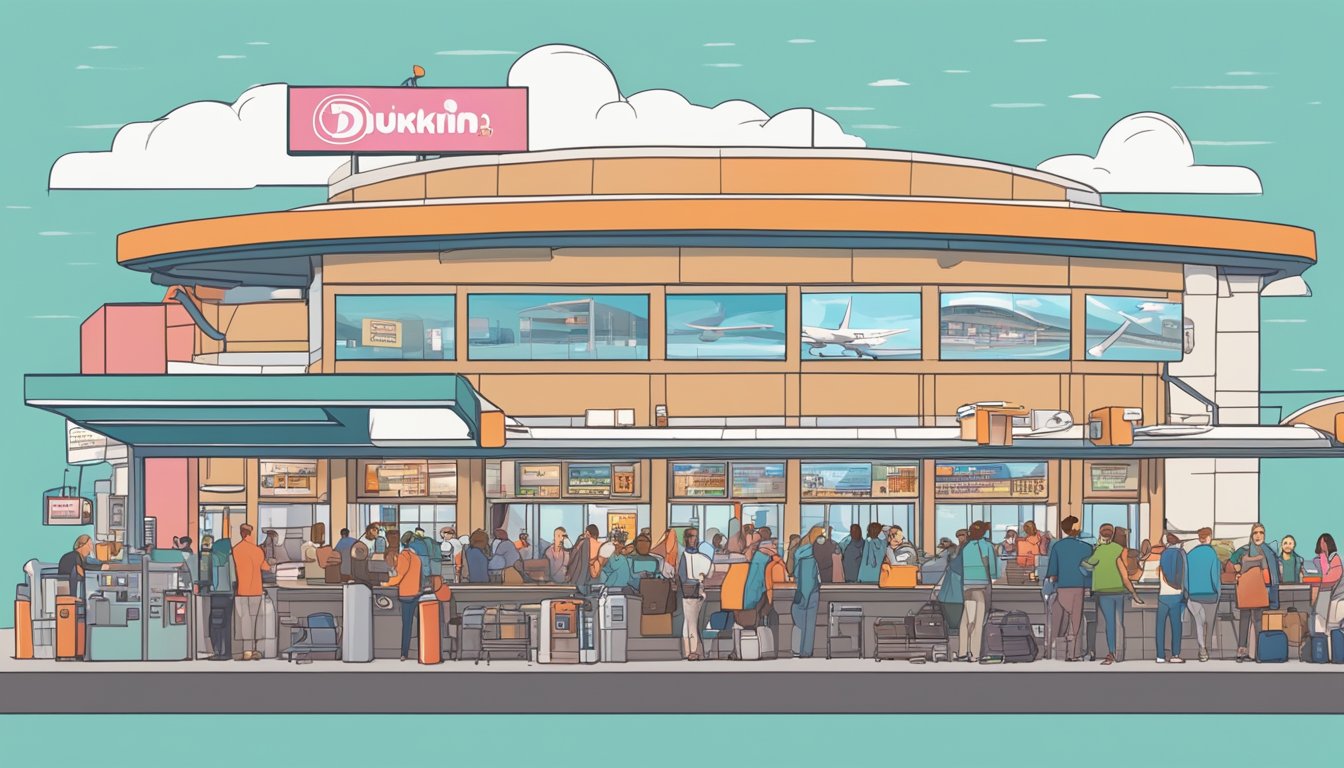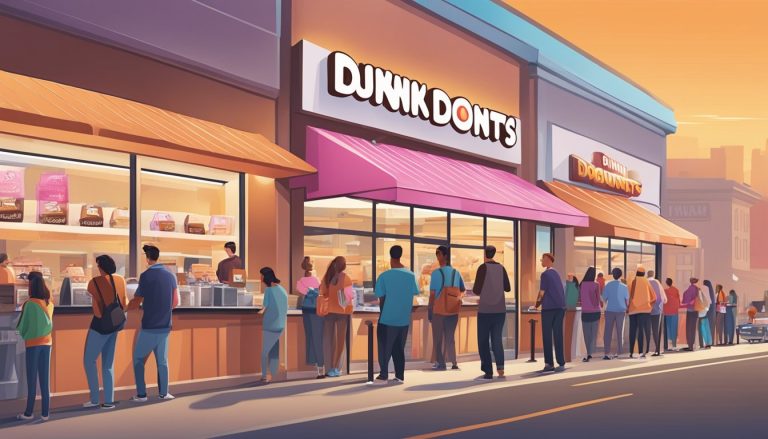Dunkin’ has emerged as a key player in airport and travel center dining, offering convenient food and beverage options for travelers on the go. The coffee and donut chain has strategically expanded its presence in non-traditional locations, targeting airports, train stations, and travel plazas. Dunkin’ found an ideal role delivering service in these high-traffic areas, catering to the round-the-clock needs of travelers and airport employees.
This expansion aligns with Dunkin’s growth strategy, focusing on locations with consistent customer flow throughout the day. The company’s menu of coffee, donuts, and breakfast sandwiches is well-suited to the fast-paced environment of transportation hubs. Dunkin’ has opened locations in various airports and travel centers, including Las Vegas Convention Center and Pilot Flying J travel stops.
Dunkin’s success in these non-traditional venues has inspired its parent company, Inspire Brands, to consider similar expansion plans for its other restaurant chains. This move reflects the growing importance of travel-related dining options and the potential for established brands to thrive in these unique environments.
Dunkin’s Impact on Airport Dining
Dunkin’ has become a significant player in airport dining, expanding its presence and changing the way travelers experience food and beverage options during their journeys. The brand’s strategic approach has reshaped airport dining landscapes across the United States.
Expanding Presence in Airports
Dunkin’ has rapidly increased its footprint in airports nationwide. The brand now operates in major hubs like Las Vegas Convention Center and JFK Airport’s Terminal 4. This expansion aligns with Dunkin’s non-traditional development strategy, targeting high-traffic locations.
Dunkin’ kiosks and stores in airports offer travelers quick access to familiar coffee blends and freshly baked donuts. The brand’s presence extends beyond just major airports, reaching smaller regional facilities like Montgomery Regional Airport in Alabama.
Enhancing Passenger Experience
Dunkin’ contributes to improved passenger experiences by providing convenient dining options. Travelers can grab coffee and snacks quickly, fitting into tight schedules between flights.
The brand’s 24/7 operations in many airport locations cater to diverse passenger needs. Early morning departures and late-night arrivals are accommodated, ensuring food and beverage availability at all hours.
Dunkin’s menu variety, including healthier options, addresses different dietary preferences among travelers. This flexibility enhances overall satisfaction for a wide range of passengers passing through airport terminals.
Competition with Other Brands
Dunkin’ faces stiff competition in the airport dining sector, particularly from established players like Starbucks. Both brands vie for prime locations within terminals to capture traveler attention.
Dunkin’s competitive edge often lies in its speed of service and familiarity to many American travelers. The brand’s lower price point compared to some competitors can be attractive to budget-conscious passengers.
To stay competitive, Dunkin’ continuously updates its airport offerings. New menu items and promotional deals aim to entice travelers and maintain market share in the highly contested airport dining space.
Menu Offerings Catered to Travelers

Dunkin’ tailors its menu to meet the diverse needs of busy travelers, offering a range of options from quick caffeine fixes to satisfying meals. The brand focuses on convenience and variety, ensuring customers can find suitable choices regardless of their travel schedule or dietary preferences.
Beverage Options for Every Taste
Dunkin’ provides an extensive selection of hot and cold beverages to suit all tastes. Their signature coffee blends cater to those seeking a caffeine boost before early flights or during layovers. For non-coffee drinkers, options include teas, hot chocolate, and various cold beverages like iced teas and fruit-based drinks.
The brand also offers customizable drinks, allowing travelers to adjust sweetness levels or choose alternative milk options. This flexibility ensures that even those with dietary restrictions can find a suitable beverage.
Hearty & Quick Breakfast Choices
Travelers can start their day with Dunkin’s range of breakfast sandwiches and wraps. These portable options combine convenience with sustenance, featuring ingredients like eggs, cheese, and various meats on bagels, croissants, or English muffins.
For those seeking lighter fare, the menu includes bagels with cream cheese spreads and a selection of baked goods. Dunkin’ also caters to health-conscious travelers with items like oatmeal or yogurt parfaits.
• Classic breakfast sandwiches
• Veggie-friendly options
• Bagels with assorted spreads
• Oatmeal and yogurt parfaits
On-The-Go Snacks
Dunkin’ recognizes the need for quick, portable snacks for travelers rushing between gates or embarking on long journeys. Their iconic donuts remain a popular choice, available in various flavors to satisfy different cravings.
For those seeking savory options, Dunkin’ offers items like pretzel twists or hash browns. The brand also provides packaged snacks such as muffins, cookies, and fruit cups, catering to travelers looking for grab-and-go items that can be easily consumed on planes or in transit areas.
Dunkin’ continually updates its snack offerings to align with changing consumer preferences, ensuring a mix of indulgent treats and healthier alternatives.
Brand Presence in Travel & Leisure Locations
Dunkin’ has strategically expanded its footprint beyond traditional storefronts into high-traffic travel and leisure locations. This approach allows the brand to serve customers in diverse settings while capitalizing on the captive audiences in airports, hotels, and other non-traditional venues.
Dunkin’s Non-Traditional Locations
Dunkin’ has made significant strides in non-traditional development, focusing on airports, universities, and travel plazas. The brand has opened locations in key areas like the Las Vegas Convention Center and the LINQ Hotel.
These expansions tap into the flow of travelers and convention attendees seeking familiar food and beverage options. Dunkin’ has also established a presence in healthcare settings, with outlets in facilities like Oak Hill Hospital in Brooksville and UMass Memorial Medical Center in Worcester.
Strategic Placements in High-Traffic Areas
Dunkin’ targets locations with high foot traffic and captive audiences. The brand has secured spots in popular leisure destinations like Great Wolf Resorts and California Park in Manteca.
These strategic placements ensure visibility and convenience for guests. In airports, Dunkin’ kiosks offer quick service to hurried travelers. Hotels and casinos, such as Arizona Charlie’s Boulder Casino in Las Vegas, feature Dunkin’ outlets to cater to guests’ coffee and snack needs throughout their stay.
Operational Challenges and Adaptations

Dunkin’ faces unique hurdles in airport and travel center locations. The brand must navigate complex regulations, staffing issues, and space constraints while maintaining its signature quality and service.
Labor and Training in Transitional Spaces
Airports and travel centers present staffing challenges for Dunkin’. High turnover rates are common due to the transient nature of these environments.
Dunkin’ addresses this by implementing robust training programs tailored for quick onboarding. The company focuses on cross-training employees to handle multiple roles efficiently.
To combat staffing shortages, Dunkin’ utilizes flexible scheduling and offers competitive wages for airport locations. The brand also partners with airport employment programs to recruit local talent.
Adherence to Airport Standards and Regulations
Dunkin’ must comply with strict TSA guidelines and airport-specific regulations. This includes enhanced security protocols for employees and supply deliveries.
The company works closely with airport authorities to ensure all operations meet safety standards. Dunkin’ adapts its store layouts to accommodate security checkpoints and passenger flow.
Food safety regulations are more stringent in airport settings. Dunkin’ implements additional quality control measures and frequent audits to maintain compliance.
Implementing Non-Traditional Format Solutions
Space constraints in airports require Dunkin’ to develop compact store designs. The brand utilizes modular kiosks and streamlined equipment to maximize efficiency in limited areas.
Digital menu boards and mobile ordering systems help reduce physical footprint and speed up service. Dunkin’ also offers grab-and-go options tailored for travelers in a hurry.
To address social distancing concerns, Dunkin’ has implemented contactless payment methods and redesigned queue systems. The company continues to innovate its non-traditional format to meet evolving customer needs in travel environments.
Comparative Analysis with Competitors
Dunkin’ faces stiff competition in airport and travel center dining. Its market position and strategies differ from rivals like Starbucks in key ways.
Market Share in Airport Dining
Dunkin’ has carved out a significant presence in airport locations across the United States. As of 2025, the brand operates in over 200 airport terminals. This puts Dunkin’ ahead of some competitors, though still behind Starbucks’ approximately 400 airport locations.
Delta Airlines has partnered with Dunkin’ to offer the brand’s products on select flights, boosting visibility.
Inspire Brands, Dunkin’s parent company, leverages its portfolio of restaurant concepts to secure prime airport real estate. This multi-brand approach gives Dunkin’ an edge in negotiations with airport authorities.
Brand Differentiation and Customer Loyalty
Dunkin’ emphasizes speed and value in its airport locations. The brand’s efficient service model caters to hurried travelers.
Menu offerings focus on grab-and-go items like coffee, donuts, and breakfast sandwiches. This contrasts with Starbucks’ more expansive food and beverage selection.
Dunkin’s loyalty program integrates with travel apps and airline miles programs. Members can earn and redeem points across various travel touchpoints.
Brand recognition plays a key role. Dunkin’s familiar orange and pink color scheme provides a sense of comfort to travelers in unfamiliar environments.
Expansion and Future Endeavors

Dunkin’ is aggressively pursuing non-traditional locations to expand its presence in high-traffic areas. The company’s strategic focus on airports, universities, and travel plazas aims to capitalize on convenience-seeking consumers.
Recent Openings and Partnership Announcements
Dunkin’ has made significant strides in non-traditional development throughout 2021. The brand expanded its footprint in Las Vegas, opening locations at the Convention Center and LINQ Hotel.
A notable addition was the Dunkin’ outlet at Arizona Charlie’s Boulder Casino, further solidifying its presence in the entertainment sector. The company also reopened its location at the new Virgin Hotel.
In Florida, Dunkin’ has been actively pursuing partnerships with travel centers and universities to increase its visibility among commuters and students.
Long-Term Strategic Growth Plans
Dunkin’ is setting its sights on major transportation hubs for future growth. The company plans to establish a presence in New York’s JFK Airport Terminal 1 and Chicago’s O’Hare Airport Terminal 5.
These airport expansions are part of Dunkin’s broader strategy to target high-traffic areas and capture on-the-go consumers. The brand’s director of non-traditional development emphasizes that this approach has been crucial to Dunkin’s growth for over a decade.
In Massachusetts, Dunkin’s home state, the company continues to explore innovative locations to maintain its strong market presence. This includes potential partnerships with educational institutions and transport networks.
Sustainability and Environmental Considerations

Dunkin’ has implemented several sustainability initiatives in its airport and travel center locations. The company aims to reduce its environmental impact while maintaining quality service for travelers.
In 2025, Dunkin’ plans to complete its transition to 100% cage-free eggs for all U.S. menu items. This commitment demonstrates the brand’s focus on animal welfare and responsible sourcing practices.
Packaging is a key area of focus for Dunkin’s sustainability efforts. The company has introduced more eco-friendly materials in its airport locations, including:
- Recyclable paper cups
- Compostable straws
- Napkins made from recycled materials
Energy efficiency is another priority for Dunkin’ in travel centers. The brand has invested in:
- LED lighting
- Energy-efficient appliances
- Improved HVAC systems
Dunkin’ has partnered with Enveritas to ensure responsible coffee sourcing. This collaboration helps support smallholder coffee growers and promotes sustainable farming practices.
Water conservation measures have been implemented in Dunkin’ airport locations. These include low-flow faucets and water-saving dishwashing equipment.
The company’s sustainable paper and pulp policy addresses deforestation concerns. This policy applies to packaging used in travel center and airport Dunkin’ stores.
Dunkin’ continues to explore innovative ways to reduce waste and improve sustainability in high-traffic travel locations. These efforts aim to minimize the environmental impact of serving millions of on-the-go customers daily.




